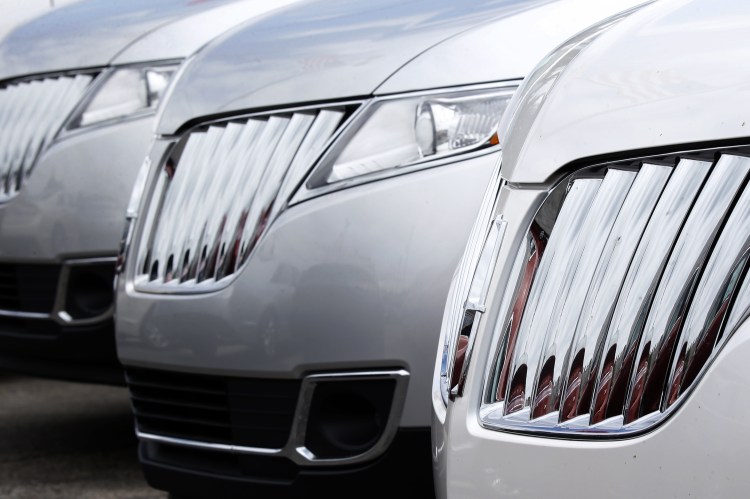DETROIT — Big discounts helped U.S. auto sales sizzle in July.
Toyota, Ford, Nissan and Chrysler all saw double-digit sales gains and General Motors’ sales were up 9 percent over last July. Honda and Volkswagen saw declines.
Analysts predicted the best July for the industry since 2006. Industry sales were expected to rise 11 percent to nearly 1.5 million, according to car buying site Edmunds.com.
Generous summer discounts helped boost sales. Automakers typically offer deals in the summer to clear out inventory before cars from the new model year arrive in the fall. But July’s discounts were unusually high.
Incentives rose 8 percent — or $216 per vehicle — over last July, according to Jesse Toprak, chief analyst for the car shopping site Cars.com. Incentives averaged $2,774 per vehicle, their highest level since August 2010.
Toyota was offering zero-percent financing on a five-year loan and $1,000 cash back on the Camry sedan. Ford offered $6,000 cash back on a new Expedition SUV. And Chrysler was peddling a $99 per month, two-year lease on a Dodge Dart.
Edmunds.com said 13.5 percent of new car loans in July had zero-percent financing, the highest level since December 2010.
While incentives are a boon for consumers, they’re costly for automakers and can hurt resale values down the line. But Ford’s U.S. sales chief, John Felice, said the trend isn’t too worrisome.
As the post-recession sales rate slows, he said, automakers are getting more aggressive, because in order to grow they need to steal sales from a competitor. That’s already happening in the car segment. Buyers are paying an average of $1,000 less for a Ford Fusion sedan than they did a year ago, he said.
But SUV and truck demand remains strong, and so do prices. Overall, he said, buyers are still paying $800 more per vehicle than they did last year. That’s because even with discounting, more people are choosing pricier SUVs and loading them up with features.
Michelle Krebs, a senior analyst at AutoTrader.com, said unlike a decade ago, when automakers had to use across-the-board discounts because they were producing too many vehicles, they’re now being more strategic with discounts.
“There’s intense competition for a pie that’s not growing,” she said. But automakers are more profitable, so they can afford to give a little, she said.
Chrysler’s U.S. sales jumped 20 percent to 140,102 for the month on strong demand for the Ram pickup, which was up 14 percent, and the new Jeep Cherokee small SUV. Chrysler sold nearly 15,000 Cherokees, almost matching sales of the larger Grand Cherokee. Jeep sales were up 41 percent overall.
Toyota said its U.S. sales were up 12 percent to 215,802 on double-digit gains for the Camry and Corolla sedans.
Toyota edged out Ford, whose sales were up 10 percent to 204,373. Ford saw big gains for the Escape and Explorer SUVs. The country’s best-selling vehicle, the Ford F-Series pickup, was up 5 percent to 63,240, while Ford’s new Transit Connect van was up 41 percent.
GM’s sales rose 9 percent to 256,160 on strong demand for its new large SUVs. Chevrolet Tahoe sales were up 51.5 percent. Cadillac sales dropped 3 percent but Buick sales were up 8 percent on the strength of the new Encore small SUV.
Nissan’s sales rose 11 percent. Sales of the electric Leaf increased 62 percent to 3,019, a record July for the car, which went on sale in 2010.
Honda’s sales fell 4 percent to 135,908. Accord sedan sales rose 11 percent, but Honda lost ground in its Acura luxury division, where sales dropped 18 percent. The company said it sold out of TL and TSX sedans as it launches their replacement, the new TLX.
Send questions/comments to the editors.



Success. Please wait for the page to reload. If the page does not reload within 5 seconds, please refresh the page.
Enter your email and password to access comments.
Hi, to comment on stories you must . This profile is in addition to your subscription and website login.
Already have a commenting profile? .
Invalid username/password.
Please check your email to confirm and complete your registration.
Only subscribers are eligible to post comments. Please subscribe or login first for digital access. Here’s why.
Use the form below to reset your password. When you've submitted your account email, we will send an email with a reset code.